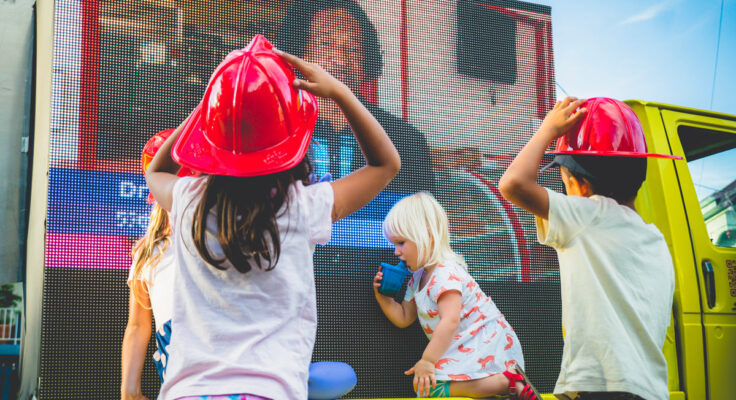“Commons Archive,” featured in the video below, is building neighbor relationships and community resilience in North Oakland’s rapidly changing Golden Gate neighborhood. Launched during the pandemic, the project evolved to include the “HEAR HERE” truck, a mobile community billboard designed to gather and share stories and encourage neighborhood interactions. The project has connected longtime and new neighbors like Terri Woodfolk-Nelson, LaDasha Berry and Sue Mark, the project’s lead artist. Below they reflect on “Commons Archive” and the neighborhood they call home.
What Is Your Connection To North Oakland?
Terri: I was born in Oakland at Highland Heights Hospital. My grandparents migrated to Oakland from Louisiana, like a lot of people that are native to this area, and bought their first home in North Oakland in the 50s. My mother went to Oakland Technical High School. The land I’m living on was once part of Oakland City College, which turned into Merritt College. My roots here are long and deep. I have almost 60 years here and my family has even longer. I’ve seen lots of changes in the decades.
LaDasha: I was raised in East Oakland, and when I was raising my sons, I chose to raise them in North Oakland. My granddad lived in North Oakland. My sons went to school at Golden Gate and we began our activism career throughout North and West Oakland.
Sue: I’ve been living in North Oakland for almost three decades. The longest I’ve lived anywhere.
Terri, How Did You Get Involved In “Commons Archive”?
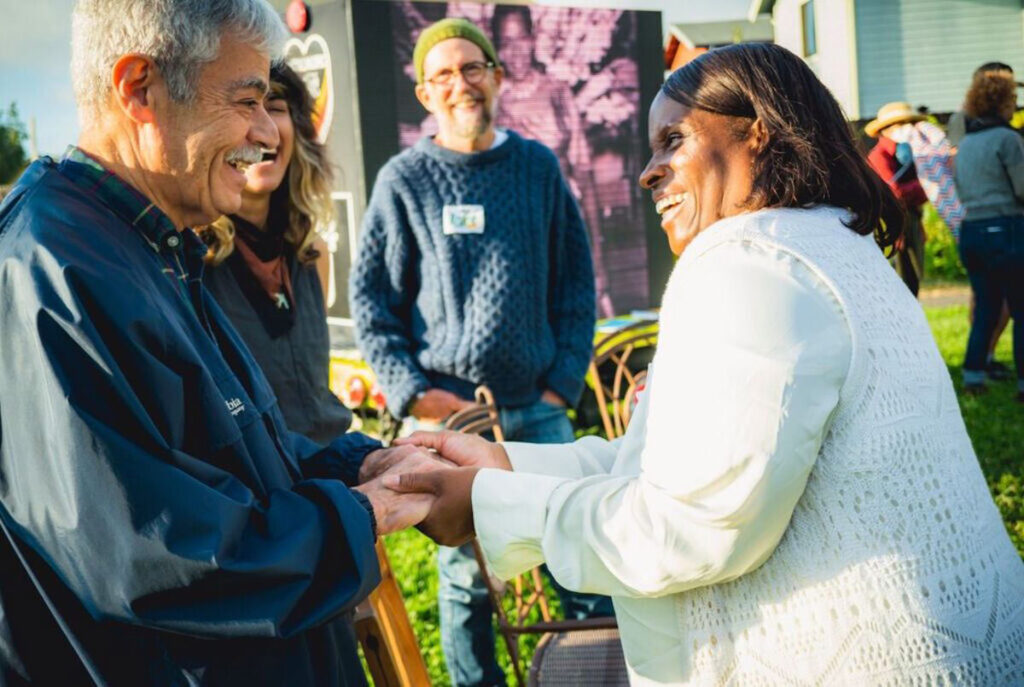
Terri: I was leaving the house one day with my husband and one of our caregivers and we saw Sue in her little cute “HEAR HERE” Truck, and we were like, “What is that?” We stopped and ended up talking for hours. I thought the truck was a brilliant idea.
Sue: That was our second drive, it was really early on. We had worked with a youth media group, and they interviewed about four or five Black families who’d been in the neighborhood for a long time, and they were sharing their stories on the video screen. I remember, Terri, you said, “If you want stories, I’ve got stories! I can tell you stories.” It was just what we had hoped would happen. And you also told me it was your dream to be able to have a block party to bring the community together.
Terri: The last block party we had was in the 80s, but we grew up having block parties every year. The 4th of July would be a big old party.
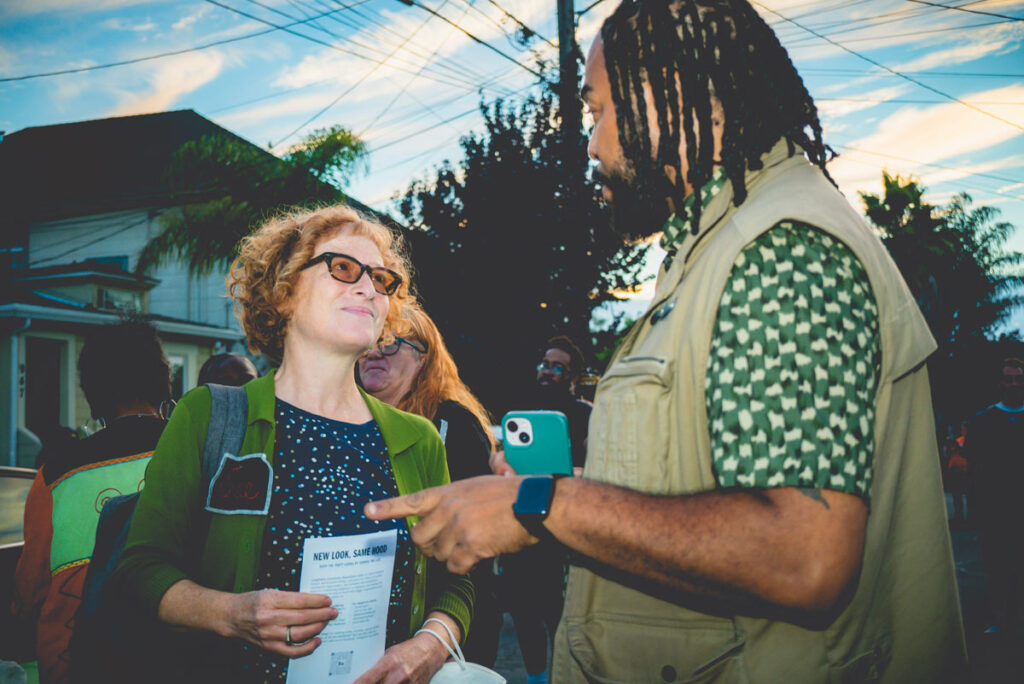
Sue: After Terri and I met at the park, we met half a dozen times on her front porch, having some cake or tea, talking about what this get-together could look like. That was an important piece of what we were doing with this project: providing support for people who wanted to have a neighborhood gathering.
Terri: We invited people from the neighborhood to come out to hear me talk. Someone from the Black Panthers movement came and talked, and we got a chance to engage with people in the neighborhood that don’t know these stories.
There were so many people that came up and spoke in incredibly moving ways about what it means to be a neighbor…
Sue Mark
Sue: We set up in the park next door to Terri’s house, and used the [“HEAR HERE”] truck to show photos of Terri’s family history while she shared her story. There were 50 or 60 people there and we had an open mic for neighbor tributes. We had no idea what would happen, and it was so beautiful. There were so many people that came up and spoke in incredibly moving ways about what it means to be a neighbor, tributes to mothers, talking about how important it is to say hello to someone when you see them on the street. It was magical. It moved me to tears.
Terri: It was magical and so uplifting. Everybody was happy. People wanted to be there and they wanted to learn more.
LaDasha, How Did You Participate In “Commons Archive”?
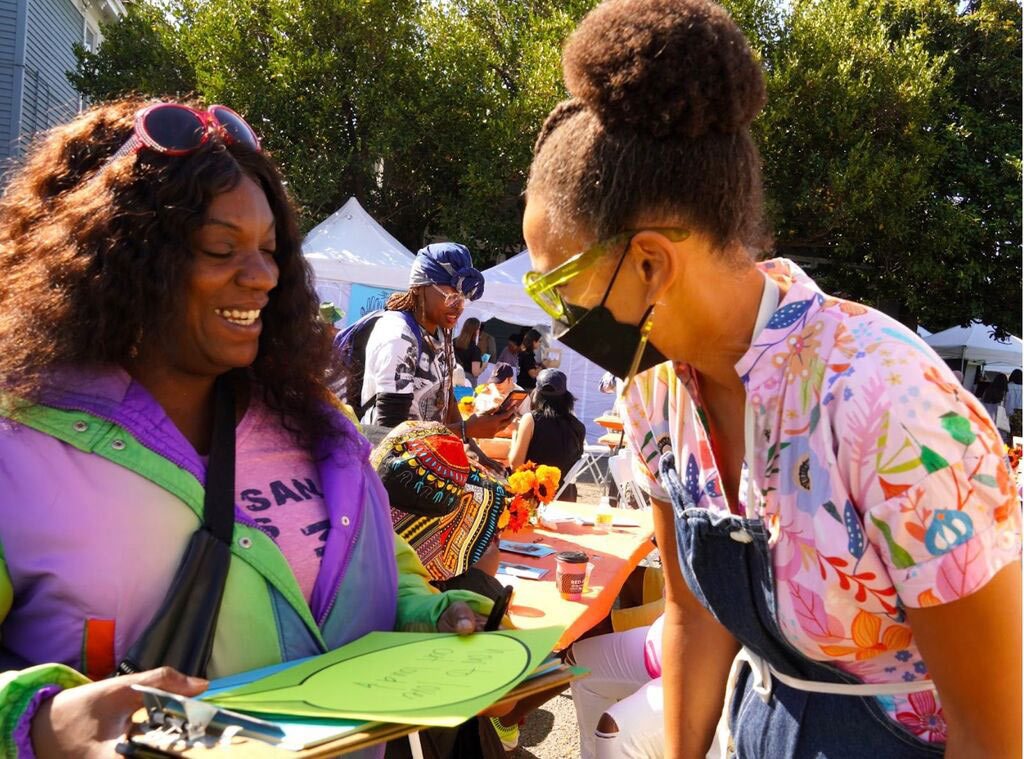
LaDasha: I’m part of the [“Commons Archive”] planning committee, the idea machine, the think tank. As a community organizer, I love bringing people together and knowing what’s going on in my community. I was given the opportunity to drive the [“HEAR HERE”] truck and I met a lot of people. Meeting with Dr. Saturu Ned of the Black Panther Party was a highlight, and my son was also very excited to meet him. It’s really cool to have the truck to help bring communities together and start conversations, and research and figure out in a grassroots way, what do people want? What do people need? I really love that. I’m a promoter and an engager. I get out there and I talk; I ask the questions. As an activist, that’s what I’m all about.
It’s really cool to have the truck to help bring communities together and start conversations, and research and figure out in a grassroots way, what do people want? What do people need?
LaDasha Berry
Sue: This truck is so much more when it becomes enlivened with people who are so passionate like LaDasha.I was so excited when she brought her son into the process, too, and they were working together as engagers. For me, also as a mom, to see this lineage of activism come to life is very powerful. LaDasha, you’re quite humble about the magnetism that you have to bring everyone into the conversation.
LaDasha: I received extensive training from superb mentors, and that’s one of our things: the humility aspect of organizing, especially when you’re going into other people’s homes. Shout out to my mentor Van Jones. He taught us the ask: What are we here for? What’s the point? And what do we need the people to do? In my mind, it’s the call to action.
Sue: LaDasha not only said yes to joining us at events, but she’s also been part of the strategic planning team to help us think creatively about how we can continue the project without institutional funding.
LaDasha: We can get caught up in nonprofit systems of making money, and then not have any self-sustainability. So we were always about self-sustainability. How are we making money to sustain ourselves without this nonprofit income? Right now, we don’t have funding, so unless we fundraise or put in our own money, we won’t have the project.
Sue: I’m so grateful to be able to learn from you, LaDasha, how to bring together the idea of community entrepreneurship—not just making money, but generating value. Not only are you coming to support the work as it’s emerging; you’re really helping to continue to foster and grow it in this way, with community and equity at the forefront.
What Is Your Vision Of A Thriving Community?
Terri: Like what I experienced growing up here in North Oakland, it was very healthy; it was a mix of people and all the families knew each other. We had block parties. People knew, loved and supported one another. Children played together, all day and night in the summertime. It was a real sense of community. Before the old woman in the house across from us died, my husband watched over her. Everybody knew each other, around the corner, up the block. It’s very different now. I have neighbors across the street that we don’t even know.
LaDasha: Thriving community is about community education mixed with community organizing and arts and culture, with an emphasis on entrepreneurship and business education. That’s exactly why I moved my boys to North Oakland. Bringing people together through community block parties, sharing music and food and culture brings in that equity and inclusion.
Bringing people together through community block parties, sharing music and food and culture brings in that equity and inclusion.
LaDasha Berry
What Do You Find Inspiring About “Commons Archive”?
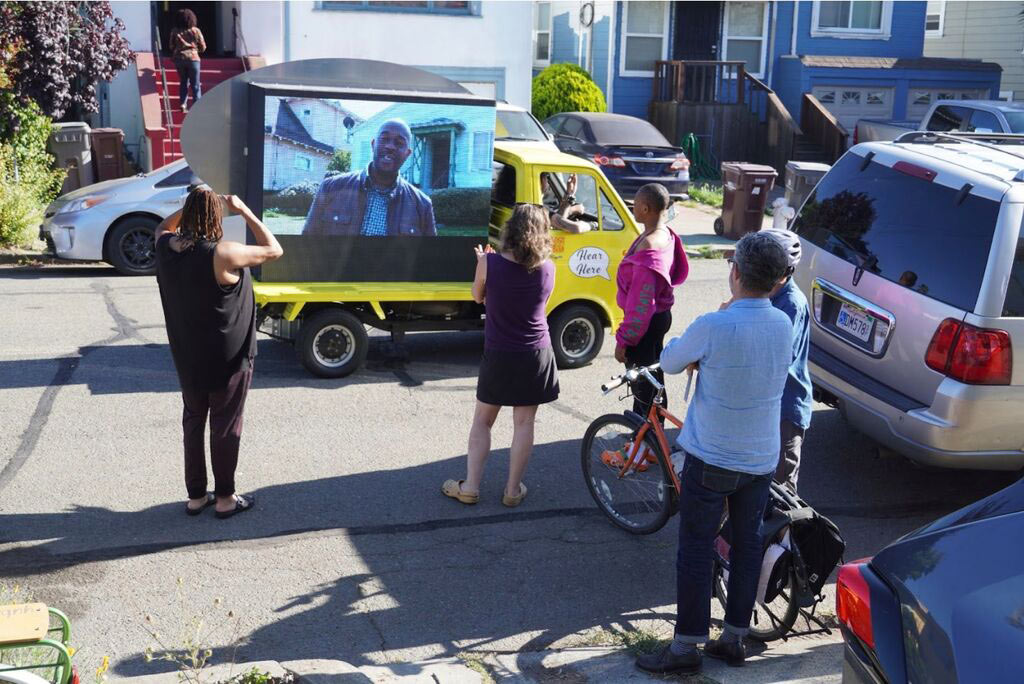
LaDasha: Preserving and archiving people’s stories and the history of the community. “Commons Archive” exists to preserve and share stories to connect the old and the new residents. That’s important for children, and history is important to me. I love timelines and seeing what happened because it lets me know why we’re here. I believe in finding your roots and doing family trees. You can’t move forward without knowing your past.
Terri said something important: She had a story to tell and Sue was willing to do the work, providing that platform and getting that story out there. The truck is visible in the community and allows people to come together. We’re bringing the unity in the community by sharing community resources that allow people to connect. And by getting their actual needs on paper and asking them, “What do you need?” or “How can we help?,” and not assuming we know. Colonization taught us that we don’t do that. Equity is being generated and elevated by us asking the people what they need and providing it.
You can’t move forward without knowing your past.
LaDasha Berry
Terri: The truck brings people together and gives people an opportunity to tell stories of how they came to North Oakland. It amazes me how few people understand why African Americans migrated here. There’s a huge story in that. They came from the South in droves, and many people here today have ancestors who migrated to escape the Jim Crow South and build a better life, like my grandparents did. And when my grandparents bought their house on 63rd in the 60s, they were the first or second Black family to buy a house on that block.
The church on Adeline, Bethany Baptist Church, was more than just a church, it was a social club and where Black people came together and loved and supported one another because they were in that struggle together. All those people put their resources together to build that church. My family were founding members. And from that the Black Panther Party started out in this neighborhood. Like a lot of things that Black people have built and supported throughout the years, when it gets successful, it gets destroyed. There’s so many stories within this story. And I think many of the newcomers to the neighborhood wouldn’t even be here if not for things that happened throughout the history of the area.
LaDasha: My grandparents participated in the Black Migration. They came from Louisiana and Arkansas. I was raised by my grandmother, and my grandfather was a Black farmer and brought all types of produce through Oakland and sold it from his truck. So entrepreneurship is important to me and that’s the way a lot of Black people survived the Black Migration. It’s important to me to know that history.
I have a lot of years of history, and that’s what I can do: be the voice for people that are gone or that are no longer in the neighborhood.
Terri Woodfolk-Nelson
Terri: I get to be a voice for a people that was here, and most of those families are gone. I have a lot of years of history, and that’s what I can do: be the voice for people that are gone or that are no longer in the neighborhood.
About “Commons Archive”
“Commons Archive” began as a collaboration between Kala Art Institute, the Golden Gate Branch of the Oakland Public Library, local community organizations, neighbors and lead artist Sue Mark. The project received a grant in 2019 through the Kenneth Rainin Foundation’s Open Spaces Program, which supports visionary temporary public art that is timely and relevant to the communities it seeks to serve.
Sue continues to lead the project with many incredible community organizations and neighbors in North Oakland including the Black Panther Party Alumni Legacy Network, Neighbors for Racial Justice, Design for Belonging and All Power to The People (AP2TP) art collective.
